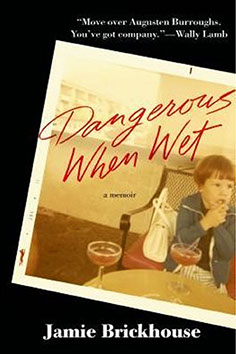
Connecting Texas books and writers with those who most want to discover them


TRAVELING?
Don't miss our
Top Bookish
Destinations
Lone Star Book Reviews
by
 Thomas H. McNeely teaches in the Stanford Online Writers’ Studio and the Emerson College Honors Program. Ghost Horse, his first novel, was winner of the 2013 Gival Press Novel Award and published in 2014.
Thomas H. McNeely teaches in the Stanford Online Writers’ Studio and the Emerson College Honors Program. Ghost Horse, his first novel, was winner of the 2013 Gival Press Novel Award and published in 2014.
Jamie Brickhouse has been published in the New York Times, the International Herald Tribune, Lambda Literary Review, The Fix, Addiction/Recovery eBulletin, and the Latin American travel magazine Travesía. He is also a guest blogger for the Huffington Post. Brickhouse spent more than two decades in the publishing industry, most recently at two major houses as head of their publicity and lecture divisions. He has also performed stand-up comedy and recorded voice-overs for the legendary cartoon TV show Beavis and Butthead. A native of Beaumont, Texas, Brickhouse lives in Manhattan with his partner, Michael.
Brickhouse, Jamie
St. Martin’s Press
978-1-4668-3730-0, hardcover, $25.99
286 pages
April 28, 2015
Reviewed by Thomas H. McNeely
To readers of recovery narratives, the trajectory of Dangerous When Wet is by now familiar: Escape from family; substance-assisted transformation of self; crash, burn, new authentic self; peace / détente with family. Here, we follow Jamie Brickhouse’s transformation from closeted son of a rising middle-class Beaumont, Texas, family to vice-president of various publicity departments in unnamed New York publishing houses; the crash and burn occur after Brickhouse loses his job following a slow, then very rapid decline into alcoholism and compulsive sexual behavior. Along the way, Brickhouse contracts HIV; after he is in recovery, his mother, the dominant, looming figure in his life, suffers an agonizing death from Lewy Body Dementia.
What distinguishes Dangerous When Wet is both the charm of Brickhouse’s voice (it’s easy to understand why, even at his lowest points, he is surrounded by supportive friends) and the carefully woven narrative (two photographs, for example, are used to mark his decline, to chilling, understated effect). Brickhouse unflinchingly records his dependence on alcohol, his humiliating sexual encounters, the isolation of his final days of drinking, and the despair that leads to the suicide attempt that lands him in recovery. The book’s best passages document the end game of his disastrous love affair with alcohol and the self-deceptions that lead to a series of relapses. His mother’s decline is rendered with a restraint that makes it all the more powerful.
Brickhouse’s relationship with his mother—Mama Jean, a widow and housewife who transforms herself through careers in stockbroking and real estate—is central to the book. She both encourages Brickhouse, urging him to become a writer, and shames him for his homosexuality. She is also central to his eventual recovery. Brickhouse returns again and again to his guilt over the emotional debt that he owes Mama Jean—he can never repay her for her love—as well as for the material support that she has given him. One also wonders about the influence that Brickhouse’s need for Mama Jean’s approval exerts over his life, and how a desire for approval might shape this memoir’s sometimes gingerly facile treatment of its material.
My hat’s off to Brickhouse for the sober courage he summons to show us the disastrous, foolish, and humiliating places that alcohol took him. The effect of sympathy as well as frustration with Brickhouse in the past—why can’t he see what he’s doing to his life?!—is one that this carefully constructed narrative skillfully evokes. I was squeamish reading Brickhouse’s stories about fellating a midget and picking up a crack whore. As shocking as these scenes sometimes are, however, they fit into a by now familiar narrative of confession which renders the disclosures, no matter how shocking, in some sense safe. His HIV-positive status is mentioned, but the book says almost nothing about the effect that this had on his life. His relationship with his partner, who is depicted here as almost preternaturally patient and forbearing, is also barely mentioned.
What Brickhouse has given us is a courageous, well-crafted, and irresistibly charming recovery story. Perhaps the darker corners of this narrative will be illuminated in future books. I look forward to reading it.
* * * * *

![]()
![]() LONE STAR LITERARY LIFE copyright © 2015–18 Paragraph Ranch LLC • All rights reserved • CONTACT US
LONE STAR LITERARY LIFE copyright © 2015–18 Paragraph Ranch LLC • All rights reserved • CONTACT US


